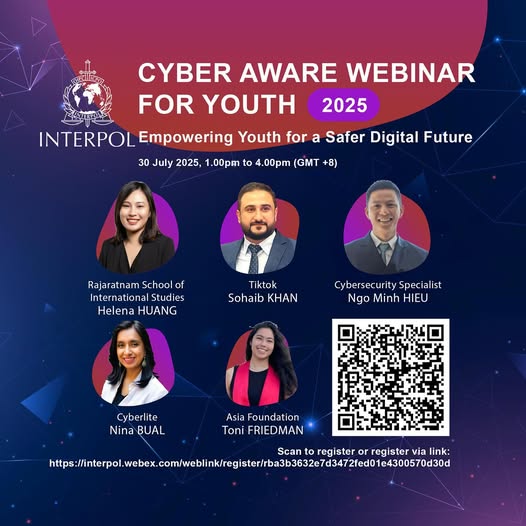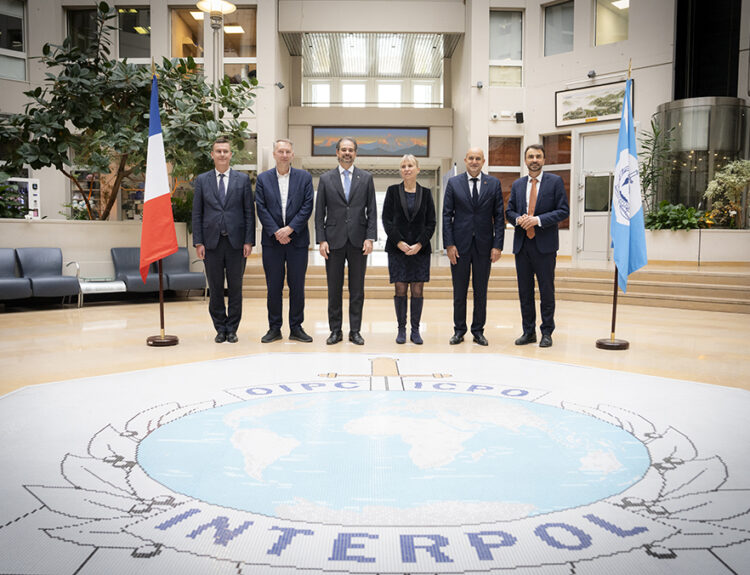ISLAMABAD – In an effort to equip the next generation with the skills to stay safe online, INTERPOL recently held its first-ever Youth Cybercrime Awareness Webinar. The event, which took place on August 12, brought together over 800 young people, parents, and educators from across Asia and the Pacific, highlighting the growing risks of cybercrime, including scams, cyberbullying, and misinformation.
INTERPOL is a global organization that helps police forces in different countries work together to fight international crime.
Experts from academia, tech firms, and social enterprises shared insights on the unique cyber threats facing young people. They noted that the same digital world used for everyday activities is also the operating ground for criminals who specifically target younger demographics with fake offers of scholarships, gaming rewards, and jobs. With the rise of generative artificial intelligence (AI), the challenge is amplified, as criminals can deploy increasingly realistic deepfakes and other synthetic media, which are difficult for the average person to detect.
The webinar also focused on the importance of responsible online behavior. Panelists urged participants to prioritize digital dignity and well-being, reminding them that their online identity is a reflection of who they are and that their digital footprint never truly fades. They encouraged young people to be mindful of their actions, as they can have real-life consequences, particularly for future employment. A representative from TikTok encouraged users to actively report harassment and inappropriate content.
A powerful moment came from a former hacker, Ngo Minh Hieu, who shared his journey from a “blackhat” hacker who caused significant financial losses to a “whitehat” security expert. His cautionary tale highlighted the dangers of cybercrime and the possibility of personal transformation, as he now works with law enforcement to combat online crime.
The webinar concluded with a clear call to action, providing participants with a list of practical steps to enhance their online safety. These tips included looking out for red flags, using strong passwords, updating software, and being mindful of online interactions.
To protect themselves online, young people can adopt the following steps:
- Look out for red flags: Be wary of offers that seem ‘too good to be true’, requests for money or passwords, and sharing of suspicious links or attachments.
- Use strong passwords: Create unique and complex passwords for each online account and consider using a password manager to keep them secure.
- Use privacy settings: Control the amount of personal information others can see by employing enhanced privacy settings on social media and other online platforms.
- Keep software up to date: Regularly update operating systems, browsers, and other software to ensure the latest security patches and features.
- Be mindful of online interactions: Never share personal or financial information with strangers.
- Monitor online activity: Regularly monitor online accounts and report suspicious activities as soon as possible.
- Use two-factor authentication: Add an extra layer of verification to online accounts in addition to passwords.
- Back up data: Regularly back up important data to prevent losses in case of a cyberattacks.
- Stay informed: Remain updated on the latest online threats and scams.
Tips for managing digital identities include:
- Curate a positive online reputation: Be mindful of what you post online, and make sure it reflects positively on you.
- Delete harmful posts: Remove any online content that could be harmful or embarrassing to you or others.
- Think before you post: Take a moment to consider the potential consequences of what you’re about to post online.
- Follow people who inspire you: Be mindful of who you follow online and ensure they are sources of inspiration and support.
- Take regular breaks: Time away from online activities can reduce the effects of stress and cyberbullying.
- Report or block harm: If you see someone being bullied or harassed online, report it to the platform and block the person responsible.
- Stand up for what’s right: Be an ally to those who are being bullied or marginalized online.






